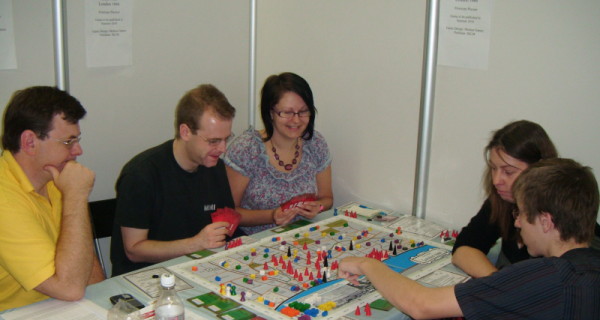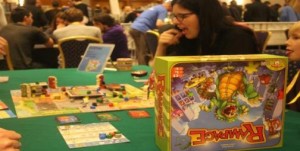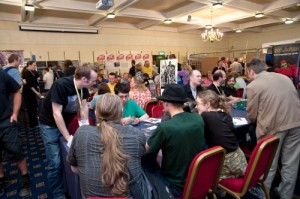Or how to get a board game published
Why ask me?
I run UK Games Expo – the UK’s largest non electronic multi format hobby game convention. By this I mean we have board games, card games, roleplaying games by a multitude of games companies in an event over 3 days that attracts 6000+ people. Now in its 6th year, this event hosts companies showing all their new games on tables where the visitor can sit down and try them out. I am also the designer of the board game Great Fire of London and have my own game design house Medusa Games.
For these two reasons I often get emails along the lines of “I have this idea for a new game, how do I get it published?” This article is going to cover some of the answers. Here then are some tips.
Do your research: Find out what is out there.
I should say right from the start that I have published – so far – one board game. Four books but only one board game. Yes I have others in development BUT that is so far the extent of my publishing expertise. There are many designers out there who are vastly more prolific than I and if you are new to board games you probably think board games are restricted to Cluedo (Clue), Scrabble, Monopoly and Trivial Pursuit. What you need to realise is that there are hundreds of companies producing many hundreds of new games each year. The competition is huge. So you first must do some research. You need to find out a bit about what all these companies are and what the games are. Find out also what the audience wants
So go to Board Game Geek. This is the focal point on the internet for all things related to board games. See what games are popular. Look at the forums and get a feel for what is liked and disliked.
Next get to a convention:
The largest board and card game convention in the world is Essen Spiel each October in Germany. 150,000 board gamers visit this over 4 days. There are 400 or so companies and 700 new games each year. Just walk the halls and see what is being made.
In the UK come to UK Games Expo in May/June. In the USA Origins or Gencon Indy are worth a visit.
Play the games, meet the designers and make some contacts. Get a feel for the different sort of game mechanics (the ways games work) and see how the successful ones often have a novel mechanic going on.
Playtesting and Prototypes
The process of publishing a board game is a little like writing and publishing a book. Indeed some companies call game designers the GAME AUTHOR. You first produce a early version and begin play testing it. This will be cardboard and sellotape and made on your home PC. You need to see if the game MIGHT work. This means getting players (often friends and family) to play the game over and over again till they and you are sick of it. The game will go through various versions, akin to drafts of a book and just as an author needs an editor to see what does not work in a book, a designer needs play testers to pick up on the flaws in a game concept. After many plays the game design will take shape.
It is a good idea to bring the game to a convention such as UK Games Expo or one of the several smaller local cons that attract a couple of hundred gamers as you can get feedback from players. Taking it to a games club is a good idea as well. be prepared for negative remarks and the need to go back to the drawing board. I have abandoned several game designs in the early stages.

Playtesting an Early Version of Great Fire at Essen 2009
OK I have a working game now what?
You now need to get a publisher. Here you have the choice of doing it yourself if you can find printers and component manufacturers or using an existing company. Just like an author landing a publishing deal you will need to convince a company that you have a game people will buy. If you have gained contacts in the gaming world you will occasionally find one of them would consider helping the game become a published game IF they feel it has merits.
This is where taking the game around the conventions can be of value because if a game has legs gamers will recommend it and a publisher might take notice. Alternatively pitching the game idea to a publisher is an option. Again by having done your research at BGG and by visiting the cons you will know who the companies are and have chatted to some and find out who is likely to be open to game proposals and who is not wanting game ideas.
The key thing at this stage however is DO NOT approach a company until you have a game well developed and play tested. Don’t turn up with an idea that you have played twice. There is a serious risk it will fall apart on play testing. Get it right first. In this regard writing books and designing games are identical.
My Game in print!
Finally if all goes well the game gets released. It is good to link this to a large convention. In the UK the UK Games Expo is the one to choose but the largest in the world is the immense Essen Spiel. Getting a stand there is a good way to reach a large audience of board game enthusiasts. We sold almost 400 games of Great Fire in 4 days there.
Retire on the proceeds!
Now do not get the idea that you can retire on the proceeds. Just like publishing books MOST games will not sell much. You can also forget about being the next Scrabble, Monopoly or Cluedo. Just as it is hard for new authors to break into the mainstream so is it VERY hard to get anywhere near a high street store. But like with books there is pride in producing a game and saying – look what I did.
Why all this talk of hobby games: surely I need the mainstream marketplace?
This leads to a final point. I often get asked by potential game designers “should I approach Waddingtons” .They have the idea that they sell the game to a BIG multinational and it is in the high street shops for Christmas and they sell millions of copies. The problem here is that only a VERY few NEW games are made each year by these big companies. Think about it – when you go to a toy shop you see endless versions of Monopoly or Trivial Pursuit. 700 new games are released each year at Essen. Only 1 or 2 MIGHT manage to penetrate that mainstream market. Most mainstream customers – your aunt Flo for example – buys one new game maybe in a year. Probably a copy of Monopoly for a niece that never gets played apart from on Boxing day.
You MIGHT be the lucky one. It is more likely however that the big multinatinals wont even look at the game.
If you instead target the game for the thriving if much smaller Hobby Game market and the game is good and you do your marketing right then it is MUCH more likely that you could sell a few hundred games to hobby gamers who love their games and each buy a good number a year. If you can get a little following then later games your make might sell too. The reality is that many companies and designers are disappointed and loose money at this business. Some better organised ones cover their costs, have fun along the way and enjoy the business. A few companies (and here I mean a tiny handful in the UK make a bit of money.) So having a realistic attitude is the right way to go.
Take home message:
So get online now and learn about the world of games via BGG.
Find out abut local games clubs and get to them and start playing games.
Then get to Essen , Expo, Origins or Gencon (and other cons).
Get your game playtested A LOT.
Then – and only then approach publishers.
Good luck and see you at UK games Expo!





Related Articles
2 users responded in this post
Dear Richard Denning,
First thanks for this very helpful article.
I have designed several games. 3 of which I have playtested till we can do no more (including at Londons’ Playtest meetup), and I think they are ready to publish.
I now intend to bring these 3 games (a board game and 2 cardgames) to UK Games Expo. Do you suggest I also book a stand? and if so what preparation, props would you advise?
Many thanks, and I look forward to meeting you at the Expo in May.
Lawrence (Daviesdesign games)
Richard I think this is an excellent article. As an inventor with up to 100 games to my name – of which 16 are currently being made under licence in India, Sri Lanka, the USA and the UK your advice is absolutely first class. You are right it takes a long time to break into this very competitive market. Inventing is the easy part, I have dreamt my last four. One of them “Word for Word” was taken by Gibsons Games and launched in January. It is the marketing that is difficult. So I wish you all the very best at your current UK Games Expo.
Mike Woods (Chairman of That Games Co.)